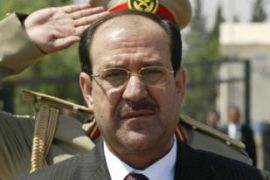US: Unstable months ahead for Iraq
US intelligence report doubts Iraqi government can heal rising sectarian violence.

US political leaders have criticised the ability of Nuri al-Maliki, the Iraqi prime minister, to govern.
Wavering support
Meanwhile, the report cast doubt on al-Maliki’s ability to heal sectarian divides as specified by US milestones for progress.
It said: “Broadly accepted political compromises required for sustained security, long-term political progress and economic development are unlikely to emerge unless there is a fundamental shift in the factors driving Iraqi political and security developments.”
The office of the National Intelligence Director issued the report a day after Bush sought to correct impressions that his support for al-Maliki was wavering in a speech on Wednesday endorsing the Iraqi premiere.
Bush’s comments also came ahead of a September assessment by Ryan Crocker, the US ambassador to Iraq, and General David Petraeus, the US commander in Iraq.
The evaluation by Crocker and Petraeus is widely seen as the potential trigger for a change in US policy in Iraq.
Sectarian violence
The intelligence report said criticisms of the Iraqi government from factions within the major Shia coalition, as well as Sunni and Kurdish parties, will add to the uncertainty over the al-Maliki government.
“The Iraqi government will become more precarious over the next six to 12 months,” the report said.
It said US-led forces supported by Iraqi troops will contribute to modest improvements in security.
But it said “levels of insurgent and sectarian violence will remain high and the Iraqi government will continue to struggle to achieve national-level political reconciliation and improved governance”.
Bush had hailed al-Maliki as “the right guy for Iraq” when the two stood side by side last November in Jordan, but doubts within the US administration have been growing.
A memo by Stephen Hadley, the national security adviser, in November cited concerns that al-Maliki “is either ignorant of what is going on, misrepresenting his intentions, or that his capabilities are not yet sufficient to turn his good intentions into action”.
Meanwhile, Bush, on Tuesday, voiced frustrations with the Iraqi leadership but on Wednesday called al-Maliki “a good man with a difficult job”.
Al-Maliki has spoken out over the criticism, saying no one outside Iraq had a right to set timetables for progress.